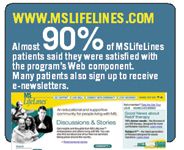Direct to Consumer: A Q&A with Jim Hoyes
Newly diagnosed patients are looking for a third-party shoulder to lean on, or someone to talk to aside from a physician.
Patients with chronic diseases often lack easy access to specific information about their condition and treatment options. To keep patients better informed, some pharma companies have developed targeted patient-education programs. Serono, a biotech company specializing in treatments for multiple sclerosis (MS) (Rebif and Novantrone), among other therapeutic areas, launched a program in 2002 designed for patients with MS. The MSLifeLines program offers a call-center service, an interactive Web site (www.mslifelines.com), an ambassador program in which 90 MS patients serve as spokespeople to the MS community, and reimbursement assistance.

Jim Hoyes, executive vice president of the neurology division at Serono.
"We have found a nice balance between supporting new patients and those who are in therapy, or those struggling with compliance," says Jim Hoyes, executive vice president of Serono's neurology division, who helped grow the program. The MSLifeLines program reaches 40,000 patients and its call staff—to date—has made more than 600,000 calls.
Pharm Exec: How has the MSLifeLines program evolved since its inception?
Hoyes: Initially it was very focused on new starts—both newly diagnosed patients and patients switching from other therapies. But now we support both new and already existing patients. For patients who have been on Rebif for two or three years, we have developed compliance initiatives and relationship marketing programs that focus specifically on patient retention.
How has that shift in focus from new patient starts to compliance changed what you do?
It made us reflect on the core activities of the call center and shift emphasis to outbound call activity, reaching out to our patient base more regularly to ensure they have what they need to remain on therapy. This made us realize the need for our staff to really understand the lifelong impact of MS on patients and their families. We also have increased the involvement of our MSLifeLines Ambassadors. These ambassadors drive much of the program's content and provide a valuable resource to the MS community.

Fighting the Battle
How does the program speak to patients on an individual level?
First, in today's environment, we have to be fully HIPAA compliant in terms of confidentiality. That's a big component of how we interact and build credibility and trust with MS patients. With that said, there are patients who need to opt into various programs. But once they do, we then can tailor the program to their needs, instead of offering just a static Web site or a one-size-fits-all approach. We encounter all kinds of patients. We have some who are doing fine on therapy but whose employer just changed health plans so they need support on reimbursement. We help them deal with that transition. Or if it's a patient who has a tolerability issue, we can have our nursing component talk to them and deal with that issue directly or in conjunction with a neurologist. We also recently launched the MS Health Manager, powered by WebMD. This tool allows people with MS to take an online assessment that helps them evaluate how they are doing on therapy and where they may need additional support. The results of their assessment are matched up with the appropriate educational offerings. At the same time, we realize that MS patients are on therapy chronically. None of these products are cures, despite great progress made in MS treatments over the last ten years.
What are the benefits of offering a patient-support call center?
Beyond the programs in the MS arena, and in other specialty disease states, there are many products that require reimbursement support and patient self-administration. Our call center caters to those needs by including reimbursement specialists and nurse specialists as a part of our call staff. They can help alleviate some of patients' anxiety about being diagnosed with MS and the challenges they may face with reimbursement. Many companies often wonder whether they should develop that capability internally or outsource it. We wanted to have the internal capability. Some of our call-center staff came from big call centers, such as those in the financial services industry. Their expertise really helped us get the infrastructure right. Furthermore, while we are committed to MS patients with Rebif and Novantrone—for patients with worsening MS—we also have a growing pipeline of additional products. Because we're in this for the long haul, it made sense to develop the expertise internally.

Is your call center structured in a way to gain information from patients?
First, we ask our patients if they want to be tracked in our database. If they don't want to be included, we certainly respect that. For those who do elect to be included, we can provide more targeted and focused information to them. But if they just want to make one call during their whole course of the disease—and we can provide the answer for them—then that's a positive for us. But many patients do seek an ongoing relationship with our staff and do sign up to receive e-newsletters and notifications about patient programs.
How does your ambassador program stimulate patient-to-patient interaction?
Our ambassadors help educate other patients on Rebif or Novantrone. They will talk about what it's like to be on therapy and how they've dealt with the disease. Because patients starting Rebif don't want to feel like they're facing the challenges of MS alone, it's helpful for them to see patients who've addressed their MS head-on. In some cases, we have patients who have not only dealt with the medical issues, but have used this opportunity to revamp their lifestyle, as opposed to letting the disease overcome them. Some patients have become long-distance bikers, or have been inspired to switch career paths. This can be very empowering for other patients. Newly diagnosed patients often are looking for a third-party shoulder to lean on, or someone to talk to aside from a physician. They want to feel free to ask basic questions such as: How do I start therapy? How do I learn to inject myself? It's more than just a clinical discussion in the context of a doctor's appointment—it's about how they deal with MS in the context of their life.
How do patients relate to the call-center staff?
Patients first make contact with a call-center representative during their info-seeking mode. But the interaction really happens once the patient makes the call and talks to either a reimbursement specialist or a nurse specialist. Patients often have too many sources of information—everything from brochures to starter kits to health plan formulary information. Our staff can help them sort through the information and determine what's really important. We have people who have been on Rebif for the last four years who continue to speak to the call center rep who took their first call. They've established a trust, even a friendship with these patients.
How do you find patients who could benefit from the program?
Our sales team and our field nurses are communicating the products and services that we offer. When we give a presentation in a neurology office, we make it a point to teach both the nursing staff (whose job it is to train patients on the therapy), as well as the office staff associated with the billing and reimbursement, about the mission of the MSLifeLines program. That way, everyone understands the goals we are trying to achieve. We also have a very comprehensive patient resource kit, which is distributed to patients at the time of their initial diagnosis or when the physician has recommended a therapy. The kit offers everything from background on MS to information on the different therapies that exist. While communications are directed at physicians and nurses, the resource kit is really for the patients. We have also run TV ads as a public service featuring Teri Garr, our celebrity-patient Ambassador with MS, as well as radio ads through Business Talk Radio Network.
How is the MSLifeLines program different from other patient-education programs?
The comprehensive nature of our program is our strength. Most companies have a call center or a basic customer service center. But we have all of our communications linked—we are able to take a call and then triage it to a specific area, as well as target both new starts and those continuing therapy. Plus, we have both internal support and external field nurses. We cover all aspects of the disease—from the first injection of Rebif to various compliance and persistence initiatives. We also added a component that focuses on friends and family of people with MS, as they too require support.
How can you determine whether the program is meeting its intended goals?
We track our call volume and the number of our patients who stay on therapy. We have seen a large improvement in patients' adherence to therapy since the first six months post-launch. We also do tracking studies for market research. We found that over 90 percent of patients are satisfied with their phone representation. Of that population, 85 percent said they were extremely satisfied with the information they receive from the program and almost 90 percent said they were satisfied with its Web component.
How do you expect to further develop this resource?
We are going to focus on strengthening the relationship with our existing customer base by offering them more customized communications. We'll also consider offering more lifestyle-support-oriented services, such as programs focused on diet, exercise, and work-related issues.
Launches
The American Heart Association launched a self-directed CPR training program. • PacifiCare launched a new campaign for its Medicare Part D effort, featuring characters from "I Love Lucy."

• The International Osteoperosis Foundation debuted a campaign of celebrity public service announcements. • The American Society for Therapeutic Radiology and Oncology launched rtanswers.com, to teach patients about radiation therapy. • The Society for Women's Health Research launched a campaign to improve women's health literacy.
Accounts
BioElectronics selected Wolf Strategic Communications to handle communications for ActiPatch.
• Bausch & Lomb selected Integrated Communications as its agency of record for prescription eyedrops.
People
David Schemelia was hired as vice president, media director at HealthSTAR. • JWT Chicago hired Ros King as president. • Abelson-Taylor promoted Molly McNally to account supervisor for Amgen's direct-to-consumer campaigns. • Xchange hired Celeste Cafiero as executive vice president, managing director.

The Misinformation Maze: Navigating Public Health in the Digital Age
March 11th 2025Jennifer Butler, chief commercial officer of Pleio, discusses misinformation's threat to public health, where patients are turning for trustworthy health information, the industry's pivot to peer-to-patient strategies to educate patients, and more.
Navigating Distrust: Pharma in the Age of Social Media
February 18th 2025Ian Baer, Founder and CEO of Sooth, discusses how the growing distrust in social media will impact industry marketing strategies and the relationships between pharmaceutical companies and the patients they aim to serve. He also explains dark social, how to combat misinformation, closing the trust gap, and more.